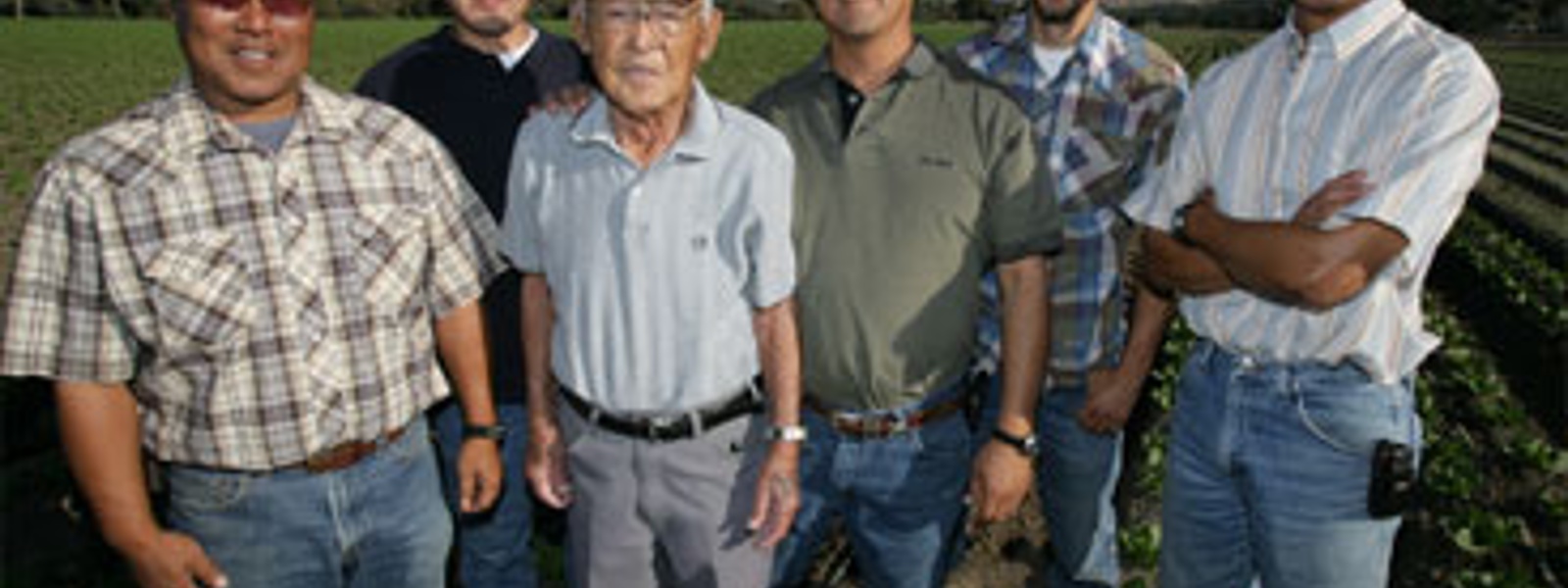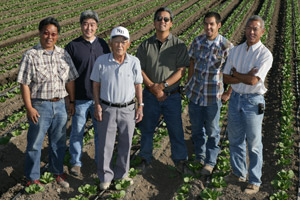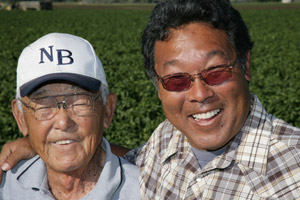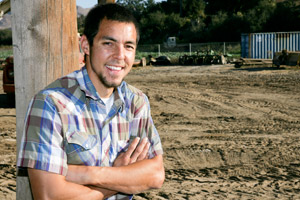The Ikeda family

A story of commitment and community

Three generations of Ikedas operate Ikeda Bros., a San Luis Obispo County vegetable grower. From left, Tom, James, Kazuo ("Kaz"), Stan, Brycen and Vard Ikeda farm the same ground that patriarch Juzo Ikeda farmed in the early 1920s.
In California's Arroyo Grande Valley, just minutes from the crashing surf of the Pacific Ocean, the Ikeda family farms the same ground that patriarch Juzo Ikeda farmed in the early 1920s.
The Japanese-born man instilled in his three sons strong family values, an appreciation for the land's bounty and a commitment to community, which family members say has led to their continued success in business and in life.
"My grandfather told my father and my uncles that, 'Anything you do, you should do in earnest. Don't do things halfheartedly. Be strong for good and weak for evil,'" said Tom Ikeda, a third-generation grower and one of Juzo Ikeda's grandsons. "That is how my dad lived his life and how I try to live my life. That is what I am trying to pass on to my own kids. It is about being a good person and looking out for your fellow man."
Juzo Ikeda lived both sides of that lesson.
The teenager left his native Japan in the early 1900s to harvest sugar cane in Hawaii. Later, at 17, he headed to San Francisco. Upon his arrival, the ship was forced to dock in Oakland because the city was burning in the aftermath of the 1906 earthquake. He soon found work farming sugar beets in the Salinas area and eventually settled in Oceano.
By the early 1920s he had started a family and joined more than 40 Japanese-American farm families to form cooperatives through which they could grow and sell bush peas, a vegetable prized for its quality and sweetness. The two cooperatives eventually merged to become the Pismo Oceano Vegetable Exchange (POVE), a grower-shipper of fresh produce that continues selling produce today.
Over the years, the Ikedas and the other POVE families expanded their mix of crops to reflect changes in consumer tastes, such as an increased demand for salads. The families also grew their cooperative by responding to innovations of the day such as refrigeration technology, which improved shelf life of the products and centralized distribution.
Ikeda Bros., one of five grower-member families who remain from the original 40-plus, grows a diversified crop mix of leaf lettuces, head lettuce, spinach, broccoli, celery, green bell peppers, parsley, cilantro, green and red cabbage and bok choy. The family is especially known for their nappa cabbage, whose crinkly leaves impart a delicate flavor to a variety of dishes. It is often served raw--such as shredded for a salad--or stir-fried, sautéed, baked or braised.
The Ikedas grow vegetables from seed or seedling until maturity. The produce is then packed and transported to the POVE cold storage and shipping facility. From there, the vegetables are sold to chain stores and food service companies throughout the United States, Canada and the Pacific Rim.

Tom Ikda, right, looks to his uncle Kaz Ikeda as an invaluable farming resource. Kaz, now 90, has been farming in the area since the late 1920s.
Tom Ikeda operates the business with his 90-year-old uncle, Kazuo ("Kaz"), cousins Vard, Stan and James, and nephew Brycen, whom they jokingly refer to as "the apprentice."
"To be more competitive, the POVE families came together at the turn of the century. Out of necessity and community, they realized that they should work together, but could make their own decisions in terms of what they farmed and how they farmed it," said Tom's sister Margaret Ikeda, who works as an architect in the Bay Area. "POVE has maintained itself for four generations. It used to be brothers working with brothers. Now it is cousins working with cousins."
Tom Ikeda points out that the relationships between the POVE member-growers are just like a family tie.
"When I talk about family and the POVE family, it is almost interchangeable," he said. "The feeling is all family. When we are dealing within our own farm, we will overlook our own personal opinions for whatever is best for our family farm. And when we are dealing with POVE, we look at what is best for the POVE family."
With the onset of World War II, the success of the family farmers that comprised the co-op was cut short when people of Japanese ancestry were ordered to evacuate the West Coast to internment camps.
"We were real industrious. We worked hard and we were farming, but the trouble was the government passed the Alien Land Law in 1913," recalled Kaz Ikeda. "Many of the farmers were leasing the land, but they couldn't buy it. We were fortunate enough that I turned 21 in 1939, so we purchased a piece of land in my name."

Fourth-generation farmer Brycen Ikeda recently joined the family business after graduating from Cal Poly, San Luis Obispo.
The Ikedas and the other four families who comprise POVE today were able to continue farming after their return from the camps because friends agreed to lease their land while they were away.
"The farms of many Japanese Americans did not survive the war and because many were afraid, they sold them for pennies on the dollar," Tom Ikeda said.
The Ikedas' close friend, Vard Loomis--for who Kaz Ikeda's oldest son is named--managed their farm while they stayed in the internment camp. The Loomis family operated a farm supply store and routinely befriended the local farmers. Prior to the war, Juzo Ikeda asked Loomis, a Stanford University graduate and athlete, to coach a Japanese-American baseball team.
"There were between 40 and 50 farmers in this area with big families, so there were a bunch of boys around here who needed some recreation after school. So my dad started a Japanese-American baseball team," Kaz Ikeda said. "Vard coached us from 1932 to 1942 until we had to evacuate."
While in the internment camps, the Ikeda boys played baseball and basketball and upon their return to Oceano, they continued to refine their skills. Kaz Ikeda, a catcher, and his brother Seirin, a shortstop, both played varsity baseball while attending Cal Poly, San Luis Obispo.
This tradition and love of sports continues as Tom Ikeda and his cousins have coached various youth levels for more than 25 years.
Last fall, the local Japanese-American community's early love of baseball was reflected in an exhibit entitled "Japanese History in South County: Farmers, Friends, Baseball, 1900-1960."
South County Historical Society President Jane Line said the exhibit raised the community's awareness of these families' contributions to the area. As a result, POVE was voted the grand marshal of the 71st Arroyo Grande Harvest Festival. This was the first time a group was ever bestowed such an honor.
"Agriculture in the Arroyo Grande portion of the Central Coast is alive and well today because of the POVE farmers," Line said.
The Ikedas' dedication to their community doesn't stop with youth athletics. The family sponsors an annual golf tournament that supports the California Highway Patrol and also donates to local organizations.
"Even though POVE is a multimillion-dollar business, we are more like that mom-and-pop business that gives back to the community," Tom Ikeda said "Through POVE or our individual family farm, or both, we support a lot of youth and community activities and we cover a lot of bases, whether participating in boards within the industry or within the community."
He points out that when it comes to farming, the goal of Ikeda Bros. is longevity.
"We'd all like to be millionaires, but you want to make a good living farming. A lot of it is a lifestyle choice--being outdoors, working with your hands and having a certain amount of independence," he said.
"As long as we can make a good living, we will continue to farm."
Christine Souza is a reporter for the California Farm Bureau Federation. She can be reached at 800-698-FARM or csouza@cfbf.com.
California's winter harvest: Vegetable variety
Snow. Ice. Subzero temperatures. While such weather conditions prevent farmers in many parts of the country from bringing a crop to market during winter, the opposite is true for major portions of California.
The gentler climate along the coast and in the desert regions gives California an advantage to not only grow vegetables all winter, but lead the nation in the production of many of them. Golden State farmers produce more broccoli, carrots, cauliflower, celery, lettuce and spinach than any other state--during the winter and throughout the year.
January and February is the peak season for these and other winter vegetables from Imperial County and nearby Yuma, Ariz., as well as California's coastal counties of Ventura, Santa Barbara and San Luis Obispo.
Growers in these spots start planting for the winter harvest in September. And with warm temperatures and plentiful sunshine--combined with a rich agricultural heritage--they're able to provide vegetables to a hungry nation and world, right now, when broccoli's nutritious boost or celery's crisp crunch is an especially welcomed treat.
In the desert, along the coast and in other areas of the state, smaller plantings of such winter favorites as beets, rutabagas, winter squash and cabbage add to California's vegetable variety.

